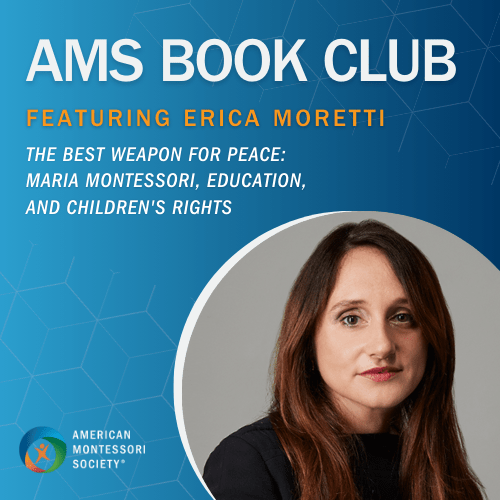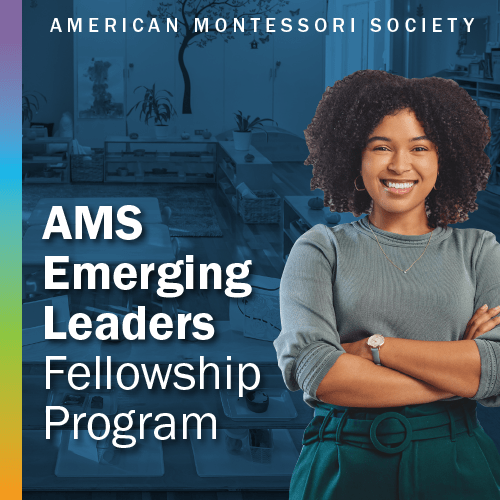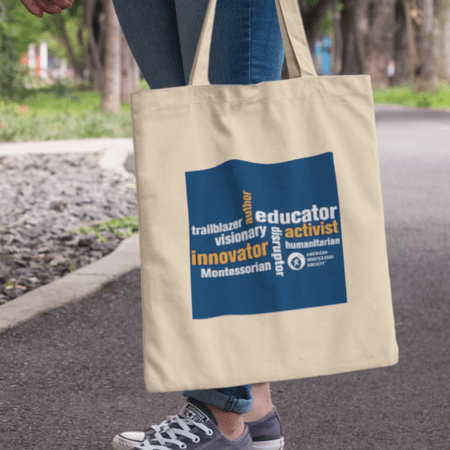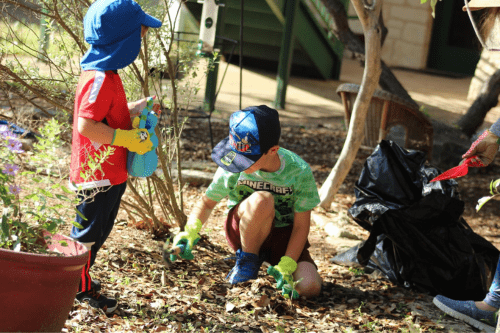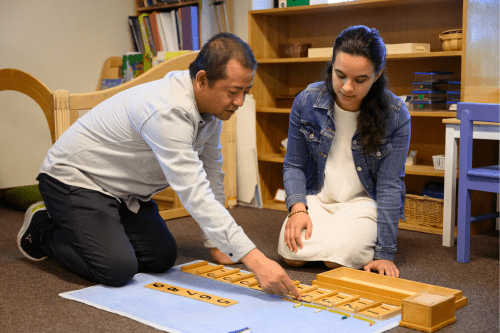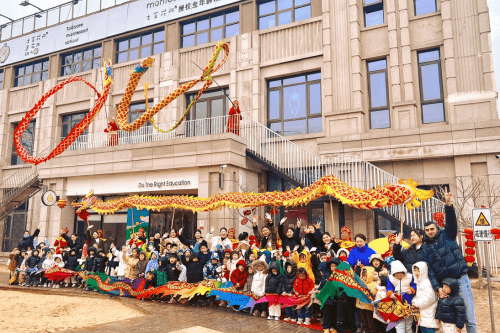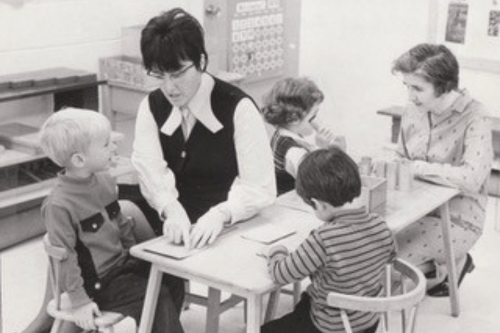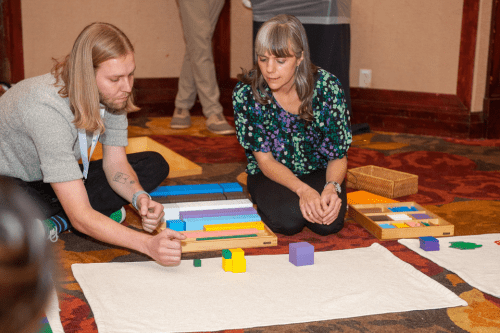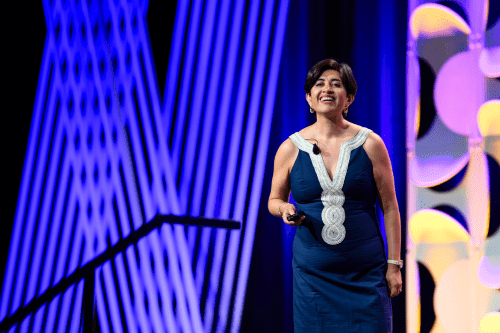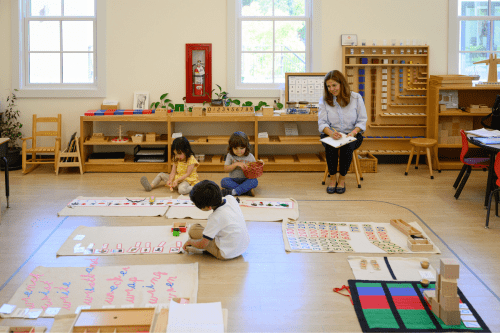Being Present as a School Leader: Words of Wisdom from One of the Best
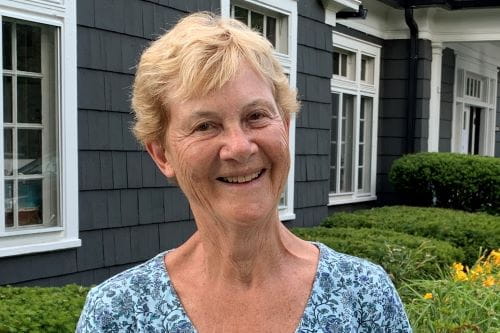
Some 32 years ago, I saw an advertisement in the local newspaper for a Montessori teacher. At the time, I had been teaching in a public school for all of two years, but I was already rethinking my career choice. I knew very little about Montessori education except what I had observed in one visit to an Early Childhood Montessori classroom, along with what I had read in the first few chapters of The Absorbent Mind.
Still, what I did know was enough to inspire me to apply for the position. During the interview, as the director asked me numerous questions about my personal educational philosophy, she remarked, “You’re very Montessori, and you don’t even know it!” She took a chance and hired me. Along the 32 years of my Montessori journey, I never looked back, except in gratitude to the school leader who opened the door and invited me in.
When the idea “Being Present as a School Leader” came up as a blog topic, Lynn Fisher was the first person who came to my mind. Lynn founded and was director of West Side Montessori in Toledo, OH, from where she recently retired after 43 years. She graciously agreed to talk with me about what it means to be present as a school leader.
Cynthia Brunold-Conesa
Tell us a little about your experience as founder and head of school for West Side Montessori. How did you come to be head of school, and for how long did you hold this position?
Lynn Fisher
As a young parent I discovered Montessori education for my 3-year-old son, Mark, and quickly became a parent volunteer in the classroom. By the time my second son, David, was 3, I was a “convert” and a “lifer”—a certified Montessori teacher with dreams of a Montessori school that went beyond Early Childhood. My goal for West Side Montessori, founded in Toledo, OH, in 1975, was to eventually serve children from toddlers through middle school. I retired as head of school in 2019 after 43 years of Montessori leadership having fulfilled that dream, and more. All four of my grandchildren were also Montessori students and both daughters-in-law are current Montessori teachers.
Cynthia
In your experience, what are the most essential qualities for a school leader to be present, to effectively lead the school?
Lynn
Balance, energy, and optimism. Those are the essential ingredients to being present as a school leader.
- School leaders must balance the needs of all constituents in almost every decision they make. And they must balance those needs against institutional needs such as budget, space, time, and human resources. Well-developed listening skills are required and then the ability to make tough decisions.
- Energy (physical, mental, emotional) to persist by continuously gathering the most talented, committed people around you to help shoulder the work and give you advice.
- Optimism. Staying positive and focused on the mission when the world feels like it is falling apart (9/11, recession, pandemic, etc.) sets the tone for the organization. And a school leader must be physically present.
Cynthia
What are some ways school leaders can effectively “build community” —within the school staff, between the school and parents, and between the school and the local community?
Lynn
When a school is small and everyone knows all the children, teachers, and parents, community is easily cultivated, especially if parents see that the school is truly child-centered and all decisions are made around that framework. Hiring capable people who believe in the mission and providing ongoing training to support their growth builds a stable faculty. Open communication regarding the rationale for decisions builds confidence and loyalty with both employees and parents. Ultimately, trust is the result.
Social media and opportunities for the neighborhood or greater community to utilize school resources help widen the school’s connections. One of the most successful programs at West Side over many years was an inexpensive parent/child infant/toddler program led by Montessori educators that introduced parents to Montessori philosophy and parenting skills to help children develop independence. Scholarships were available so anyone could attend.
Cynthia
How can school leaders help or encourage teachers and other staff to grow professionally?
Lynn
Be the example. Demonstrate how you are constantly working on your leadership skills. Require ongoing training for everyone and pay for it. Send as many people as you can afford to Montessori conferences. At West Side, we determined it was most important to hire the right person to fit the mission, someone who was likely to stay in the Toledo area, and pay for their Montessori certification, rather than hire someone because of their certification who is not a good fit for the school.
Cynthia
In what ways can school leaders give teachers and staff opportunities to take on leadership roles?
Lynn
From the beginning, even when there is no money, involve employees in planning events and activities as volunteers. Set the tone by always being the hardest worker. Determine interests and skills and as the school becomes more established find ways to recognize and financially reward those who embrace leadership roles. Offer rotating leadership roles such as Team Leader so that more leaders are constantly developed. When employees feel their voice matters and their skills are appreciated, then leaders emerge. There is a culture and spirit of shared purpose.
Cynthia
How important is it for school leaders, themselves, to be lifelong learners, and what are the most pressing professional development areas for Montessori school leaders today?
Lynn
School leaders are the visible embodiment of the school. They set the tone for everything. If the mission of the school includes lifelong learning, then it is crucial that all constituents see the continuous growth of the leaders.
Leading a school today is far more challenging than when I started West Side Montessori. A few examples are:
- Licensing and regulations, which are extensive, complex, and sometimes at odds with Montessori philosophy.
- Parents are more demanding and outcome oriented. They sometimes view education as a purchased service and treat educators accordingly.
- The cooperative Montessori philosophy is not in sync with the American winners vs. losers culture that puts extreme pressure on children to succeed.
Professional development for school leaders today must be comprehensive, including business skills, but most important are people skills—listening, collaborating, interviewing, problem-solving, and persuading. My goal was always to surround myself with people who were smarter and more skilled than I was and then listen and make the best group decisions.
Cynthia
How can school leaders include teachers, staff, and parents in the development and implementation of short- and long-term goals and visions for the school?
Lynn
Periodic retreats and annual planning sessions can be structured in multiple ways so that everyone has a say before changes to the mission, vision, and goals are implemented. Utilizing professional outside experts to lead this work helps keep perspectives fresh and everyone engaged. Results are always published and reviewed regularly with all constituents and shared on social media.
Cynthia
While teachers are the ones who spend most of the school day with students, how do you see the director’s role and responsibility with respect to the success of students?
Lynn
This is perhaps the most challenging area of school leadership. It certainly was for me. Trusting and supporting teachers is a must. This is easy when children are focused and making developmentally appropriate choices most of the time. Children are happy. Parents are happy. Teachers feel successful.
Providing appropriate resources for children who are seriously struggling for whatever reason is critical, but not always possible. Assessing the fit between the child’s needs and the school’s ability to meet those needs is ultimately one of the most important and stressful aspects of teachers’ and administrators’ work. Montessori educators and parents want to believe we can serve every child successfully, but there is always the question of balancing the school’s human resources with the needs of the child.
Cynthia
Many Montessori schools experience growing pains, and I know that West Side expanded through several phases over the years. What is the tipping point that causes the director and board to take that plunge, especially when it involves a sizable financial investment?
Lynn
At West Side, my personal vision from the beginning was a large school encompassing multiple levels. The school began with one Early Childhood class in a rented church room. We quickly doubled in size and added a Lower Elementary program, grade by grade, and outgrew the low-cost church space after five years. Next, we moved to an abandoned strip mall renting one corner of the building. The inexpensive monthly rent and available space allowed us to continue adding, over ten years, up to five Early Childhood classrooms, four toddler classrooms, two Lower Elementary and two Upper Elementary classrooms.
At that point we hit the proverbial brick wall. We ran out of space and were crowded with almost 500 students through 6th grade. This was the late 1980s, and parents were asking for a Montessori middle school program. Our Board of Trustees and I decided the parent leadership and core family support warranted taking the plunge to begin a development program, raising money to buy land, start the middle school, and create a purpose-built campus that would support our long-term needs and wishes. We were ambitious and determined, but it ultimately took almost 30 years to amass the 37 acres of woods, meadows, pond, and complete the 60,000+ square ft of classrooms, gymnasium, gathering spaces, administration offices, etc. This was accomplished bit-by-bit as money was raised through capital campaigns, auction events, and favorable loans obtained with federal loan guarantees.
Additionally, the school purchased a small Montessori school that was being shut down by the state in another Toledo suburb. That decision was made in order to change the perception of Montessori education in that community, as this was when we were preparing for our first capital campaign. Several board chairs and the largest financial gift in the school’s history have come from families that started at that campus—the Perrysburg Campus. It has operated as a satellite program for well over 20 years.
I credit the financial and business expertise of our trustees coupled with consistent educational leadership for the ongoing success of the school, especially the ability to weather the COVID-19 pandemic successfully.
Cynthia
We are living in very polarized times. How can school leaders effectively guide their staff and parents through changes that might create divisiveness within their own school community?
Lynn
Stick to your principles and focus on your mission, values, and beliefs. Frame your decisions based on those and on what is best for the children you serve. For example, when the COVID-19 pandemic hit in March of 2020 and schools shut down in response, West Side quickly activated the Safety Committee and made sure medical professionals were included. Not all employees or parents were happy with all the decisions and steps taken over the next two years regarding in-school learning, masks, and immunizations, for example, but the decisions were consistent and rationally communicated. In the end, very few parents were disgruntled and left the school or tried to agitate. It was an extremely stressful time for everyone, and some educators chose to leave. In the end, the school remained stable—enrollment is strong, and the school leadership is positioned to weather the next crisis.
Cynthia
I’m curious about the Safety Committee—is this something the school had in place ahead of time to activate in place of an emergency? Who makes up the committee?
Lynn
Yes, the Safety Committee was in place prior to the pandemic. The safety needs of a larger school are so extensive that it’s important to have procedures in place for a range of emergency situations. There were parents on the committee, and also some teachers. When the pandemic hit, as I mentioned, the school brought in medical professionals. The committee’s role was to research options, propose protocols, help make school-wide decisions, and keep parents informed. If parents know that you’re making the right decisions for the right reasons, then they trust you.
Cynthia
What is the most important advice you can offer to aspiring school leaders, or those just starting out?
Lynn
My advice is to read every good leadership book that comes along. Find mentors who model the values you strive to emulate. Mine was Marie Dugan. After West Side became an accredited Montessori school, she encouraged me to become a member of the AMS Accreditation Commission, which allowed me to visit schools and learn from Montessori leaders from Massachusetts to Maui over a ten-year period.
But unless Montessori leadership is your passion and you are willing to work harder than you have ever worked in your life, don’t do it! For about 20 years I told my husband, Roger, each year was going to be easier than the last and I believed it. He finally set me straight and would physically pick me up at school to go watch the sunset. This helped me find balance in my life; it’s important to have someone outside of school who can help you laugh at the absurdities. Stay healthy, energized, and positive about your work.
Cynthia
I can imagine that after 43 years as West Side’s leader, it must have been difficult to let go of something you had dedicated so much of your life to.
Lynn
I’m very happy with the school. It’s in a good place. It has excellent leadership. It has an amazing culture, teachers, board, students, all of it, but I don’t feel it’s mine. I feel that my work is done, and it really belongs to them and to the community now. It’s easy to retire, leaving it in the hands of people who want to maintain this exceptional culture. I’m happy that I was able to make my dream come true.
The author wishes to thank Lynn Fisher for her participation in this interview, and especially for sharing the wisdom and insight gained throughout her successful 43 year tenure as an inspiring school leader. Readers are invited to view this PBS special feature documenting the complete story of West Side Montessori, from its founding in 1975, through its growth and expansion, to Lynn’s retirement in 2019.
About the Author
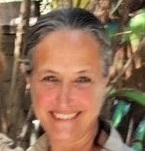 |
Cynthia Brunold-Conesa, MEd, is an educator of adult learners at two AMS teacher education programs. She has 23 years experience as a lead guide at the Elementary and middle school levels. Cynthia also publishes on a variety of Montessori topics. She is AMS credentialed (Elementary I – II). Contact her at cynthia.conesa@meipn.org . |
Interested in writing a guest post for our blog? Let us know!
The opinions expressed in Montessori Life are those of the authors and do not necessarily represent the position of AMS.




